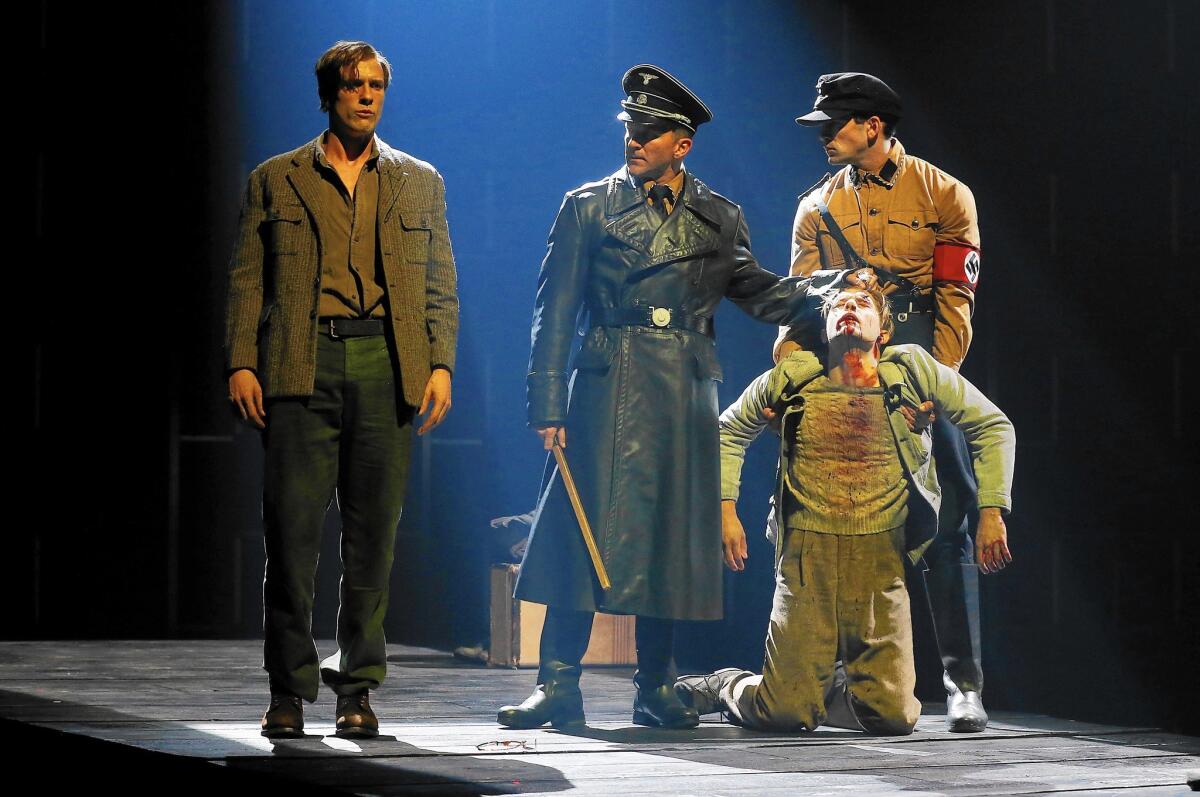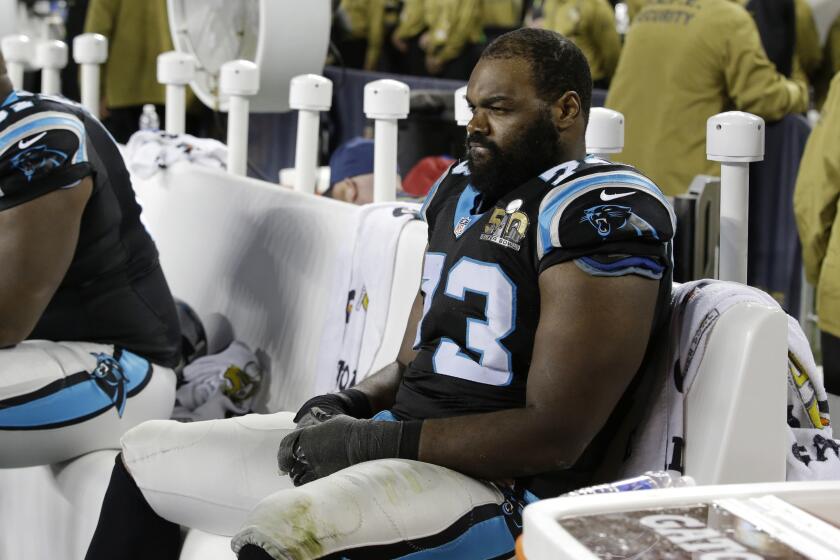Review: ‘Bent’ exhibits enduring power of love, courage and identity

Moisés Kaufman’s muscular revival of “Bent,” which opened Sunday at the Mark Taper Forum, renders what many had written off as a parochial drama about the persecution of homosexuals in Nazi Germany into a gripping tale of love, courage and identity that today can be universally appreciated for its enduring theatrical power.
A landmark of gay theater, playwright Martin Sherman’s “Bent” premiered in London in 1979 with Ian McKellen before being produced on Broadway with Richard Gere just as his “American Gigolo” fame was kicking into high gear.
SIGN UP for the free Essential Arts & Culture newsletter >>
The play helped reclaim the pink triangle, the symbol the Nazis affixed to the clothing of homosexual inmates of the concentration camps, as a sign of gay liberation. But Kaufman’s production, while deeply respectful of the gravity of the historical material, reveals that there’s much more to this drama than a history lesson.
This was news to me. “Bent” hasn’t been revived all that often by major companies — the only staging I’ve seen was at Yale by undergraduates in the early ‘90s — and the 1997 film adaptation, which featured Mick Jagger in drag, barely made a blip on the radar.
Kaufman’s direction, making canny use of Beowulf Boritt’s stark and nimble set, precisely calibrates not just the acting of this first-rate company but the dramatic intensity of a work that in the wrong hands can be a punishing experience for theatergoers.
The play, after all, boldly confronts the sadism and murderous violence unleashed on Nazi prisoners, of which homosexuals were considered the lowest of the low. Sensationalism — a bogus charge — was leveled by some of the play’s early critics, who no doubt didn’t appreciate their sympathies being extended in untraditional ways.
But the hushed quality of the staging here allows us to keep track of the inward drama of the characters without ever losing sight of the brutality of their situation. Somehow the play makes room for humor, even if the campy sort quickly morphs into the gallows variety.
The ensemble is led by Patrick Heusinger, who plays Max, the protagonist whose hedonistic ways are about come to an abrupt end. “Bent” begins with Max waking up with a colossal hangover and strange black-and-blue marks on his body as his boyfriend, Rudy (an affecting Andy Mientus), fills him in on his debauched behavior while clamorously fixing breakfast.
Rudy isn’t pleased with Max’s compulsive partying and doesn’t have any desire for sex mixed with pain. But he’s used to handsome strangers such as Wolf (Tom Berklund) staggering to the bathroom fully naked after a night with his amnesiac and faithless lover.
What sweet, simple and accommodating Rudy is not accustomed to, however, is having his home invaded by Nazis on a manhunt for one of Max’s tricks. But Weimar-era Berlin, with its sexual license and freewheeling cabarets (Jake Shears from the Scissor Sisters offers us a taste of the drag festivities in his role as club proprietor Greta), has given way to a dangerous new epoch, in which laws are being passed against vulnerable minorities.
This is the context within which Sherman sets the story of a character whose carefree, irresponsible and emotionally stunted nature will be challenged by nightmarish events that would be hard to believe were they not ripped from the pages of 20th century history.
After two years on the lam, Max and Rudy are captured and placed on a boxcar heading for Dachau. It’s hard to say which is worse, the physical or psychological torture or whether survival is preferable to quick death.
Sherman is adept at distilling the action into theatrical gestures that open up our understanding of the forces at work on the characters. The influence of Bertolt Brecht can be detected in such moments as when an SS officer steps on Rudy’s horn-rimmed glasses, symbol of the intelligentsia, before taking more violent measures.
Max enters his cell with a yellow star, which he received after proving his heterosexuality in the most horrific manner possible. He was tipped off by another gay prisoner, Horst (a piercing Charlie Hofheimer), that pink triangles represent the bottom caste, but Horst is far too politically evolved to approve of what Max has done with this information
The second act of the play revolves around Max and Horst’s deepening relationship as they move a pile of stones from one area to another and then back again. Although these characters couldn’t be more different in their handling of their hellish predicament, they offer each other the fleeting opportunity of redemption, which is beautifully captured in a scene in which they find a way of making love without touching one another as an armed guard hovers menacingly nearby.
“Bent” is a very ambitious play that tries to do a little too much. With so much going on, there isn’t time to fully examine Max’s character, and there are times when his psychology seems a touch generic (as when he’s made to repeat the line “queers aren’t meant to love”).
Fortunately, Heusinger is able to wring an enormous amount from Max’s reticence. His portrayal exposes both the pride his character takes in his own wiliness and his growing shame over his tendency to compromise his conscience and cut deals with enemies. The final moments between Heusinger’s Max and Hofheimer’s Horst are anguishing in their restraint.
Kaufman’s production manages to avoid the danger of using the Holocaust as a metaphor for gay oppression and internalized homophobia. It’s more than that obviously, as Sherman, a gay Jewish American long based in London, needs no reminding.
The deadly seriousness of the situation is never absent in Kaufman’s staging. The play’s shorthand theatricality doesn’t paint a realistic portrait, but the way the production humanizes these victims of genocide ultimately make atrocities, past and present, all the more real.
Gay rights have come an enormous way in the 36 years since “Bent” was first done. The timing is fortunate for Center Theatre Group to be presenting this potent production of “Bent” with the tender gay coming-of-age musical “Girlfriend” at the Kirk Douglas Theatre. In this summer when many are celebrating that marriage equality has become the law of the land and when President Obama is reminding African leaders that gay rights are, indeed, human rights, it is important to remember that looking back is perfectly compatible with moving forward.
-------------------
‘Bent’
Where: Mark Taper Forum, 135 N. Grand Ave., L.A.
When: 8 p.m. Tuesdays-Fridays, 2:30 and 8 p.m. Saturdays, 1 and 6:30 p.m. Sundays. Ends Aug. 23.
Tickets: $25 to $85 (Ticket prices subject to change.)
Info: (213) 628-2772, www.centertheatregroup.org
Running time: 2 hours, 30 minutes, including one intermission
SIGNUP FOR OUR NEWSLETTERS:
Stunning photos, celebrity homes: Get the free weekly Hot Property newsletter >>
SIGN UP for the free Indie Focus movies newsletter >>
SIGN UP for the free Classic Hollywood newsletter >>
More to Read
The biggest entertainment stories
Get our big stories about Hollywood, film, television, music, arts, culture and more right in your inbox as soon as they publish.
You may occasionally receive promotional content from the Los Angeles Times.











